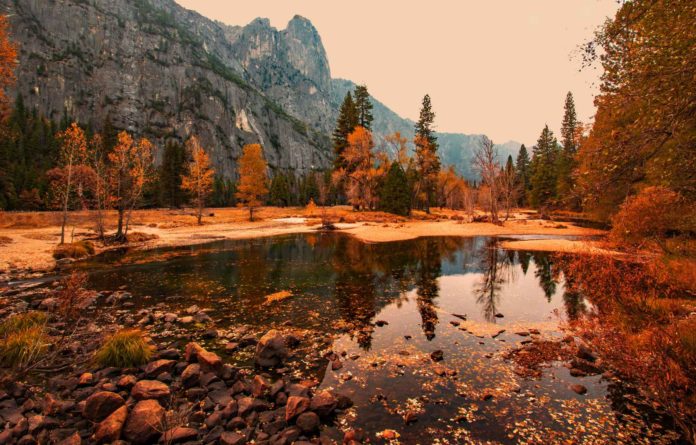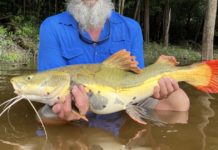If you ask a dozen fly fishers to describe the major threats to our angling, you’ll find a fair amount of agreement. You’ll hear their concerns about public lands, and habitat loss, and pollution, and over-fishing, and poor management practices, and invasive species. You may even have an angler mention our kids’ addiction to video games. There’s a fair amount of consensus regarding all those issues across the outdoor community.
What you won’t find, though, is agreement on the single largest threat to our fishing: human-caused climate change. Which is a shame, especially since climate is the only issue that impacts all of us regardless of where we live or which species we pursue.
Climate is the proverbial 800 lb. gorilla in the room. Everyone with a pulse and an internet connection has heard that it’s a massive problem — and, conversely, that it’s not. Some people will tell you that climate change is as obvious as the nose on your face, while others will claim it’s a hoax. Some point to the overwhelming scientific consensus, others deny that a consensus exists. Some say that our planet is warming because we’re burning fossil fuels, while others believe any warming is natural. There’s no such thing as unanimity on climate change, at least among sportsmen and women, and that’s because the discussion has become so incredibly polarized and partisan.
If you share which political party you support, and which media outlets you follow, I can predict with a fair amount of accuracy your views on climate. Which, truth be told, is disturbing. Science is science and it really shouldn’t matter whether you get your information from FOX, CNN, or MSNBC, or from the NY Times, USA Today, or Breitbart. As Daniel Patrick Moynihan once noted, “You are entitled to your opinion, but you are not entitled to your own facts.”
Yet here we sit, debating whether climate change is a “thing” — and if it is, whether it’s human-caused or natural, and if it is human-caused, whether it’s a problem or not, and if it’s a problem, whether we should address it or just live with it, and if we should address it, why not kick the can down the road until we’ve squeezed another 20 or 30 years of profit and convenience from fossil fuels?
And then there’s the related question of whether we should focus on the issue. To use a Shakespearean term, is climate ‘germane’ to our fishing or is it completely irrelevant? Where do we even start?
At the risk of ruffling a few feathers, let’s begin with some actual scientific facts. Climate change is real, it’s human-caused, and it’s impacting us right now. To quote the most respected scientific organization on the planet, the U.S. National Academy of Sciences (NAS): “Climate change is one of the defining issues of our time. It is now more certain than ever, based on many lines of evidence, that humans are changing Earth’s climate.”
The world’s largest general scientific society, the American Association for the Advancement of Science (AAAS), concurs, saying: “The overwhelming evidence of human-caused climate change documents both current impacts with significant costs and extraordinary future risks to society and natural systems.”
The scientists at NASA report: “The planet’s average surface temperature has risen about 2.12 degrees Fahrenheit (1.18 degrees Celsius) since the late 19th century, a change driven largely by increased carbon dioxide emissions into the atmosphere and other human activities.”
Or if you prefer empirical evidence — information acquired through direct observation — over other forms of data, you might appreciate what I learned a while back from the members of a Montana hunting & fishing club.
“Runoff in Montana starts far earlier now than it did 30 or 40 years ago, and it also ends far earlier. Consequently, the rivers and creeks are lower and warmer during the summer, with fewer fish. At the same time, Montanaʼs heavy winter snows come later — when they come at all — and the elk and mule deer have an easier time staying high in the mountains, and safe from sportsmen, until the hunting season is over. Ponds that folks have fished all their lives, the same ponds where they hunt ducks and geese, are drying up and disappearing. Forest fires are increasing, as are the diseases and insects that kill trees.”
It’s sad to say, but the mountain of empirical evidence continues to grow. I’ve personally experienced an entire litany of climate-related impacts here in Montana, including warmer winters, earlier run-off, hotter summers, longer droughts, unprecedented insect infestations, dead and dying forests, extended fire seasons, larger and more extreme wildfires, massive amounts of noxious smoke, warmer rivers and heat-related fishing closures.
The climate impacts are different back east, of course, but they’re still obvious. Friends from Maine to Florida share stories about increased precipitation, hotter temperatures, higher humidity levels, stronger storms, coastal inundation, growing numbers of ticks and mosquitoes, unprecedented flooding, sea level rise, and a steady northward march of invasive species.
When the changes right out our front doors match up exactly with the dire warnings from our scientists, and when the only people who disagree insist on quoting chapter & verse from the industry that’s responsible for the lion’s share of the warming … well, call me crazy but I tend to trust what I see with my own eyes. It’s obvious that climate change is already impacting our fisheries.
Which leaves us with little choice but to confront the issue head-on. There are millions and millions of sportsmen and women in the United States — approximately 40 million, by the most recent USFWS count — and we have to decide whether or not we have a moral obligation to protect our landscapes and waters from the ravages of climate change. Here are some relevant questions we should all ask ourselves — along with my personal responses.
Are we really seeing changes to our climate?
Yes, as a longtime Montanan, I’ve seen the northern Rockies grow noticeably warmer and drier over the last 30+ years.
Are those changes making things better or worse?
Worse. Larger wildfires, dying forests, warmer rivers, and clouds of noxious smoke are bad for our landscapes and waters, our fish & game populations, and sportsmen and women in general.
Are our observations confirmed by science?
Yes, absolutely. There is an overwhelming consensus in the scientific community that our CO2 emissions are warming the planet and putting our future at risk.
If we don’t address human-caused climate change, will future generations of anglers suffer the consequences?
There’s no doubt about that. If we don’t step up now, we’ll leave our kids and grandkids a world damaged and diminished by our inaction.
Can one person make a difference?
No, not really. Climate change is a huge global problem that won’t get better without U.S. leadership. One person can’t do much. Working together, though, 40 million American sportsmen and women can have a serious impact.
Is there a downside to acting on climate?
Our scientists tell us we have to act, and our economists assure us that switching from fossil fuels to renewable energy will save us money and improve our economy. So while there’s always a downside — look at the wagon makers who went out of business with the rise of the automobile — climate action far, far outweighs inaction.
So where does that leave us? Well, we need moral and ethical clarity to tackle a massive issue like climate. Which is why I find myself turning to the Golden Rule. We should treat others the way we’d like to be treated.
The bottom line is that we all love to fish. Our kids and grandkids deserve to inherit clean waters and healthy landscapes, while future generations should benefit from the same opportunities we enjoy right now. And that’s on us. We are responsible. Unless we address climate change while there’s still time, the places we fish will eventually become unrecognizable. We can’t allow that to happen. When it comes to the great outdoors, we have a responsibility to leave it better than we found it. Contact Congress and tell them to act on climate.
Credit: Source link






























